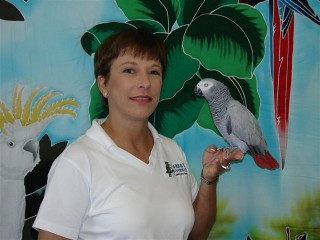PINEVILLE Several months ago, south Charlotte's Karen Cheek Justice went nose to beak with some of the rarest parrots in the world.
The Spix's Macaw is extinct in the wild. The last time the beautiful blue bird was spotted was in Brazil in 2000. It is now presumed dead.
There are only 120 Spix's Macaws left in captivity, 50 of them in Qatar.
In March, Justice, founder of Parrot University in Pineville, spent four weeks at the Al Wabra Wildlife Preservation in Qatar training eight of those birds to submit to medical procedures without becoming stressed.
She also helped train three huge Hyacinth Macaws to fly.
Justice; friend Nicholas Bishop, a professional bird handler at the Tarona Zoo in Australia; and Nicole Lang, a volunteer from Cologne, Germany, were invited to the Preservation by Sheikh Saoud Bin Mohammed Bin Ali Al-Thani.
While there, the three stayed in a dormitory on the site. Their lodging and meals were provided in exchange for their hard work and expertise in bird training.
Their mission: Teach the Spix's Macaws to accept liquid hormones to aid in fertility.
“Since there are so few of them, their genetic diversity is minimal and fertility is impaired. Birds can breed at any time if all conditions are right, but they can't breed if they are stressed,” Justice said.
The three devised an intricate training program that began with enticing the birds to the fence with nuts as a reward.
The next step was to teach them to bite a chopstick through the fence and hold on for 15 seconds. When the birds could do that reliably, they added a puff of air to the birds' faces. After the air, they added a few drops of water, and finally, the hormones.
Justice says days began about 4:15 a.m. and wound down about 8:30 or 9 in the evening.
The three followed the lead of the regular staff taking an hour and a half or so break at midday to stay out of the worst heat. Because of the high temperatures in the summer – 120 degrees with 80 to 90 percent humidity – all the animals there had an indoor air conditioned facility available.
While they concentrated on birds, they also got to visit with the other 2,500 creatures on the preservation, including more than 100 different endangered species of birds, mammals, reptiles and amphibians.
“I looked at this trip as repaying some of the debt we have to these birds for taking them from the wild. The object of the Spix's project is to increase their population and put them back into the wild,” Justice said.
